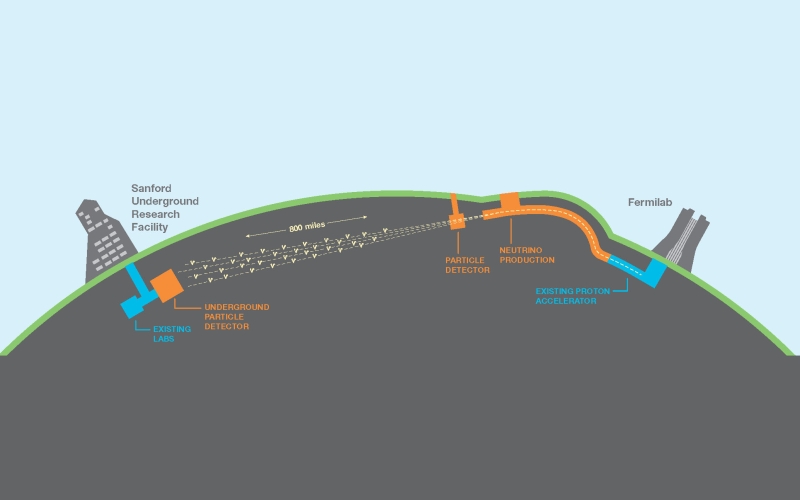
The Ross and Yates headframes, at the Sanford Underground Research Facility, sit above the clouds covering the Black Hills in October of 2023. Photo by Stephen Kenny.
An international panel of physicists that convenes once each decade to prioritize future particle physics research is recommending infrastructure development alongside new and expanded scientific projects at the Sanford Underground Research Facility (SURF).
Since January 2023, the Particle Physics Project Prioritization Panel (P5) has been distilling input from the high energy physics community into a report that identifies strategic priorities, accounting for cost and schedule scenarios as well as other global plans. Last week, the P5 report “Exploring the Quantum Universe” was approved by the High Energy Physics Advisory Panel (HEPAP), which advises the U.S. DOE and NSF funding agencies on the national particle physics program.
The report outlines recommendations for a number of large projects, including the Deep Underground Neutrino Experiment (DUNE), that can take years or decades to build and require contributions from thousands of scientists and billions of dollars in investment.
The report states: “With SURF, the US has created a premier underground laboratory that is built on a decades-old distinguished history. The realization of this facility adds unparalleled infrastructure capability to the suite of national laboratories in the US. This facility enables the US to be an international host for neutrino and dark matter experiments recommended in this report.”
“The P5 report highlights the important role that SURF plays in the advancement of physics in the United States and around the world,” said Mike Headley, executive director for the South Dakota Science and Technology Authority and Laboratory Director of SURF.
The panel recommended pursuing a re-envisioned set of enhancements related to DUNE, which is led by Fermi National Accelerator Laboratory in Illinois and now under construction at SURF. In particular, the report recommends funding for the third far detector in South Dakota, as well as increased accelerator and detector capabilities at Fermilab.
The P5 report also recommends funding for expansion of research space at SURF beyond the construction of LBNF/DUNE to house next-generation experiments. Initial funding for this proposed expansion was approved by the South Dakota state legislature in 2023. Private funding is being sought for the excavation of the new underground spaces, in a second phase of the expansion. The P5 panel recommends the DOE fund the outfitting of the new research space following excavation to ensure continued U.S. leadership in particle physics.
“The public private partnerships we are forging at SURF will drive the future of innovation in our country for decades to come while providing a huge return on investment with the growth of high-tech economy in our state and region,” Headley said.
The P5 report further recommends a third-generation (G3) dark matter experiment, beyond the world-leading LUX-ZEPLIN (G2) experiment now underway at SURF. The report states: “Continued support by both DOE and NSF is needed to maximize the science and US leadership. A second, complementary G3 experiment would maximize the discovery potential and would teach us more about dark matter if one of the G2 experiments has promising results.”
The 2023 P5 report represents the major activity in the field of particle physics that deliver recommendations to U.S. funding agencies. This year’s report builds on the output of the 2021 Snowmass planning exercise — a process organized by the American Physical Society (APS) Division of Particles and Fields that convened particle physicists and cosmologists from around the world to outline research priorities. This membership division constitutes the only independent body in the United States that represents particle physics as a whole.
“The P5 report will lay the foundation for a very bright future in the field,” said R. Sekhar Chivukula, 2023 chair of the APS Division of Particles and Fields and a Distinguished Professor of Physics at the University of California, San Diego. “There are extraordinarily important scientific questions remaining in particle physics, which the U.S. particle physics community has both the capability and opportunity to help address, within our own facilities and as a member of the global high energy physics community.”
For more information see this news release issued by the High Energy Physics Advisory Panel on Dec. 8, 2023.
